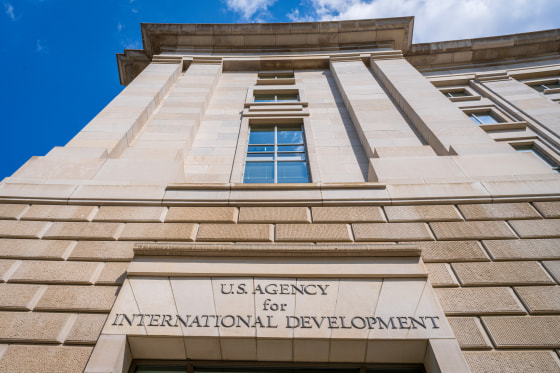
The future of the U.S. Agency for International Development, which is at the center of America’s humanitarian assistance efforts abroad, is still up in the air just one week after the Trump administration started to almost completely freeze U.S. foreign aid.
More than a dozen current and former officials and people familiar with the discussions have revealed that Trump administration officials are actively considering transferring USAID’s power to the State Department, further hurting an already crippled organization.
Nearly 60 senior career officials at USAID have been sidelined, hundreds of employees and contractors have been laid off or placed on furlough, and U.S. foreign operations have come to a halt in the last week. In the next days, thousands more similar occupations could also face furloughs or terminations.
Prominent signs in the front foyer of USAID’s Washington offices seemed to have been taken down on Friday, leaving those who remain to prepare for the prospect that the organization may close completely.
We must continue to have a separate voice and capacity for development within the U.S. government. Democratic Senators Jeanne Shaheen of New Hampshire and Brian Schatz of Hawaii, as well as Democratic Representatives Gregory Meeks of New York and Lois Frankel of Florida, stated in a statement late Friday that USAID is, by statute, an independent organization separate from the State Department. An Act of Congress would be necessary for any proposal to change that framework.
Sen. Chris Murphy, a Democrat from Connecticut, cautioned in a post on X that a president cannot abolish an agency that has been appropriated by executive order.
President Donald Trump has yet to name a head of the federal humanitarian aid organization, despite a social media frenzy that named hundreds of secretaries, ambassadors, special envoys, and top advisers before to his inauguration.
Several sources told NBC News that Pete Marocco, who was appointed by the Trump administration to lead the State Department’s Office of Bureau of Foreign Assistance, has been primarily responsible for the agency’s downsizing. According to the sources, Marocco served in a number of national security roles during the previous Trump administration, including at USAID, where his efforts to increase authority and reduce budget prompted officials to draft a dissent paper that finally resulted in his dismissal.
One USAID official acquainted with his previous efforts said, “What he’s doing now is frighteningly similar to everything he was trying to do at USAID before, but this time he’s destroying it.”
Opponents of the Trump administration’s decision to drastically reduce USAID and halt U.S. foreign aid contend that the “America First” cuts eventually help the country’s enemies.
Sen. Chris Van Hollen, a Democrat from Maryland, stated on Friday that Trump’s USAID purge and foreign assistance halt are already harming aid delivery efforts and elevating China’s stature in the world at our expense.
As another USAID official warned NBC News, “If you kill an institution, you are not going to revive it overnight.” He is essentially endangering the foreign policy goals of Trump and Rubio.
Requests for comment from NBC News were not immediately answered by USAID or the State Department.
The actions taken by Marocco, including the decision to place nearly 60 USAID policy-making career civil servants and foreign service officers on administrative leave, were predicted by Project 2025, the comprehensive report that was started by the Heritage Foundation and dozens of other conservative groups that support Trump.
The Project 2025 documents described a larger attempt to streamline USAID and stated that the conversion of those civil servant positions into political appointee responsibilities should be pilot-tested.
